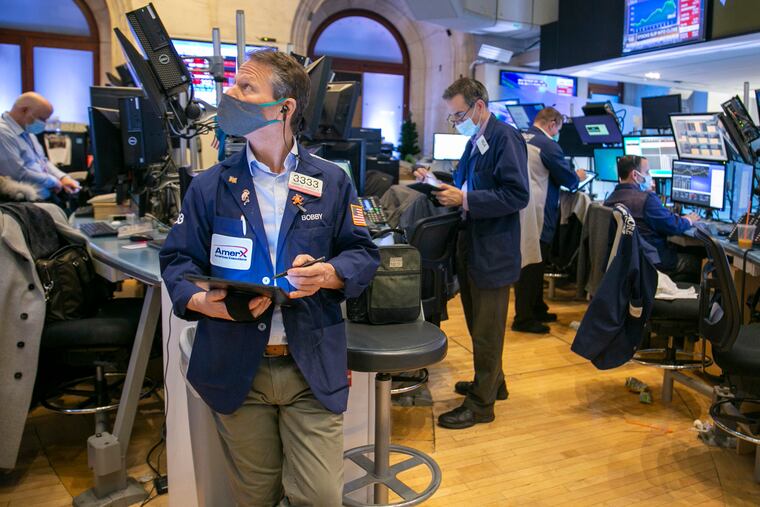As nightmare in Ukraine unfolds, investors should sit tight
Sit tight if you're a Mom-and-Pop investor. These geopolitical selloffs are short-lived.

Amid scary headlines of war breaking out in Europe and higher prices of oil and gas, it’s best to sit tight, especially for mom-and-pop investors, some experts urge.
Instead of making panicked moves in retirement and other investment accounts, financial planners said, you should view these geopolitical shock events as short term. The biggest impact will likely be to oil and gas bills, said Tim Chubb, chief investment officer at Girard wealth management firm in King of Prussia. “Higher energy prices, more than trade, is where we’ll see the impact for the U.S.”
Geopolitical uncertainty has roiled the stock markets — measured by broad benchmarks such as the S&P 500 index. The market has already been selling off for days ahead of Russia’s attack and bombing of Kyiv and other Ukrainian cities and has fallen more than 10% from highs in January, crossing into what’s known as a “correction.”
Chubb points out that the tumbling market also presents, in cold, harsh Wall Street lingo, a buying opportunity. For professional investors, “I hate to say this, but it’s a stock picker’s dream,” Chubb said.
Put simply, stocks are cheaper at the moment, and that’s usually the best time to buy, said Chubb. Relative to their growth prospects, for example, “this is the most oversold we have seen technology stocks since 2014 and 2015.”
“I always put more money into my S&P 500 index fund during market shocks like these,” said Dan Young, who teaches finance and marketing to doctoral business students at Goldey-Beacom College in Wilmington. “Stay invested. There is no need to make any drastic changes to an investment portfolio.”
Wall Street is now watching to see whether that will juice inflation even more, and prompt the Federal Reserve to reconsider interest rate hikes at its next meeting in March.
Cyber security sector poised to surge
There’s growing concern that cyber warfare — a Russian specialty — could be on the near-term horizon for U.S. companies, which could increase spending to prevent sophisticated cyber attacks against targets such as data centers and networks.
“With a significantly elevated level of cyber attacks now on the horizon, we believe added growth tailwinds for the cyber security sector and well-positioned vendors should be a focus sector for tech investors during this market turmoil,” said Dan Ives, technology analyst with Wedbush Securities in New York.
With high-profile cyber security attacks by Russia over the last few years, “it’s a matter of when, not if, increased cyber warfare activity kicks into the next gear,” Ives said. He believes the cyber security firms most likely to benefit from additional Ukraine-driven spending are Palo Alto Networks; Zscaler; CrowdStrike; Tenable; Varonis’ Fortinet; Telos; Mandiant; and CyberArk.
Will the Fed still raise rates?
Yes, say bond investors — but perhaps only a 0.25% increase in March, instead of the expected 0.50% hike that’s been forecast.
“More Fed governors will be speaking [Thursday and Friday], and it’s possible we will see the central bank raise rates 0.25% instead of 0.50%” as its first hike, said Patricia Healey, senior vice president of research and portfolio manager with Cumberland Advisors.
As for Russian bonds, “We get notifications from custodians and at least one said ‘these securities are restricted’ and they were all Russian bonds. So some institutions are writing down the value of their Russian bonds.
Emerging markets
Perth Tolle, founder of the Life + Liberty Indexes, said the Ukraine invasion “is just as surprising as a market crash or the mortgage crisis. Yes, we saw it unfolding a few weeks ago, but we didn’t know if it was going to happen.”
“In a way it’s worse, because those events were financial. This is not related to the financial system at all. It’s the whim of a dictator,” Tolle said. The index she helped created has no allocation to Saudi Arabia, Russian, Chinese or Venezuelan companies, and is the underlying benchmark for FRDM, the Freedom 100 Emerging Markets ETF.
“We solve the problem of autocracy concentration in emerging markets indexes by using what’s called a freedom-weighted approach, for investors who have to have money invested in emerging markets,” Tolle said. The strategy uses human and economic freedom metrics as primary factors in the investment selection process.
“Freer emerging markets are akin to higher-quality institutions. When something like this happens, we see a flight to gold and Swiss francs, the U.S. dollar and Treasuries, and to emerging markets that are more free than Russia and China.”